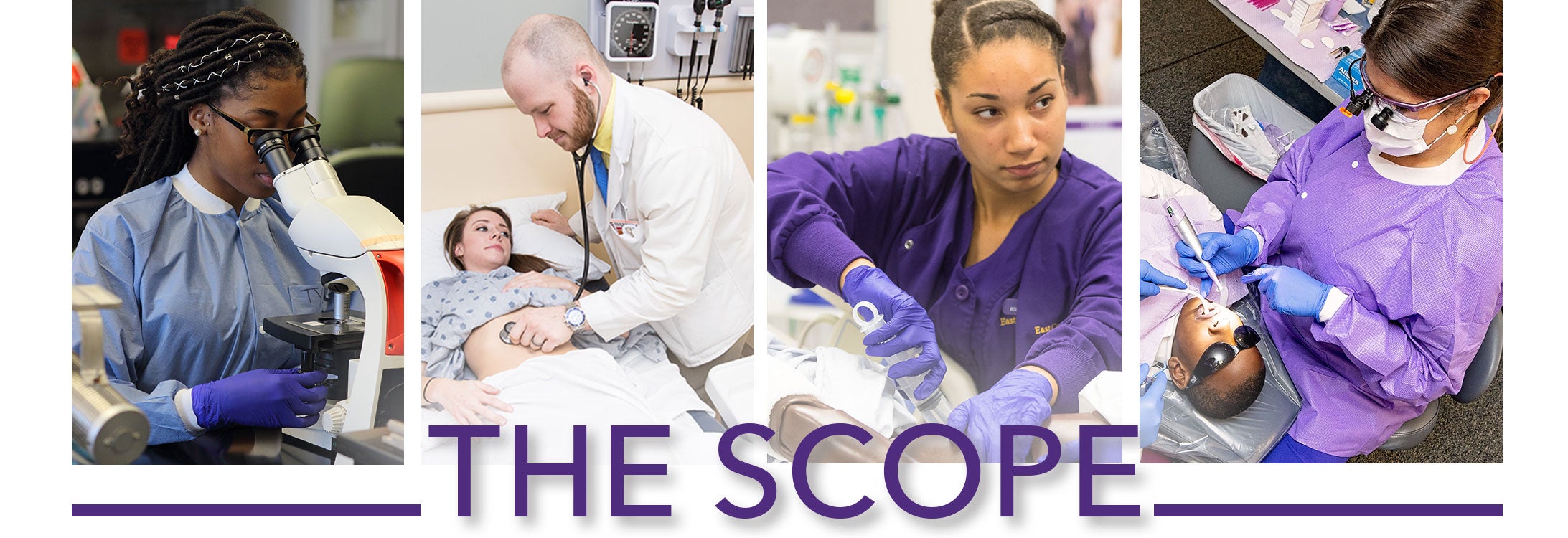June 2020
Welcome to “The Scope,” the newsletter of the ECU Division of Health Sciences.
This publication will highlight many of the ways this campus serves eastern North Carolina and meets the missions that unite us all.
This issue focuses on the division-wide response to a global health crisis—in the face of unprecedented logistical challenges—while continuing to educate our students and provide care to those who depend on us. While COVID-19 has changed the way we live and work, it has also spurred creativity.
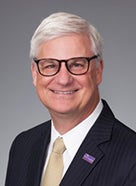
Mark Stacy, MD
Out of necessity came innovation, and our faculty, staff and students found new ways to succeed together.
Over the last few weeks, there has been a nationwide call to action to do better—to be better—in standing up for equality, fairness and diversity. We are already taking steps to better address these important issues and more authentically represent the missions of this division’s colleges and schools and the diverse communities within them.
While the long-term, more tangible impact of the pandemic on our future is still uncertain, one thing is for sure. We will move forward together, and we will have stories to tell.
You will read some of those stories here. I hope you will find “The Scope” not only a newsletter, but as a meeting point to discuss timely topics and celebrate achievement, collaboration and innovation. These are all part of our mission to be leaders in health care and education for North Carolina and beyond.
We are so glad each of you is a part of our story.
Mark Stacy, MD
Dean, Brody School of Medicine
Vice Chancellor, Division of Health Sciences
Education
Faculty across the Division of Health Sciences wasted no time transforming curriculum and education, even with challenges of cancelled clinical experiences and face-to-face instruction. They joined Main Campus counterparts to work and teach from off campus while social distancing.
The Brody School of Medicine staged a drive-through Match Day in March, giving the popular milestone for fourth-year medical students a brand-new look and giving faculty and staff an opportunity to congratulate the members of the Class of 2020 who matched with residency programs nationwide.
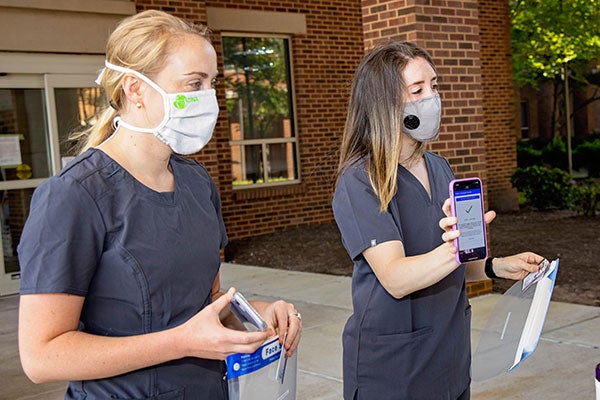
Screening procedures take place outside the College of Nursing.
Colleges and schools also found a new way to celebrate commencement. Following ECU’s virtual graduation ceremony in May, the Brody School of Medicine, the College of Allied Health Sciences, the College of Nursing and the School of Dental Medicine filmed web-based celebrations during which faculty, staff, friends, alumni and fellow students wished them well.
Campus simulation labs and virtual standardized patient programs have also helped students meet curriculum requirements through virtual experiences and telehealth simulations.
The Office of Clinical Simulation has provided telesimulation capabilities, using video conferencing platforms to provide education, training, and performance assessment to students at off-site locations. Simulation technology specialists David Schiller and Shod Kilpatrick from Brody, and Jeremy Smith from the College of Nursing developed a platform in which students have access to important clinical training from their homes.
Division leaders worked together on evidence-based guidelines for a carefully crafted, phased return of faculty and some students from colleges and schools across campus as they resumed clinical and research activities.
Some Brody students returned to clinical rotations on June 8, and students in the College of Nursing nurse anesthesia program were recently among the first to return to their clinical placements during the last week of May and to simulation labs on June 4. Students in the School of Dental Medicine and College of Allied Health Sciences will resume clinical experiences in the coming weeks.
Visit this video on YouTube for the closed-captioned version.
Patient Care
ECU’s promise to eastern North Carolina has long been to improve quality of life and open doors to accessible health care for all. Delivering on that pledge during the pandemic has been at the forefront of individual and collective missions across campus.
ECU Physicians launched its virtual visit technology to safely triage suspected COVID-19 patients, a service it later expanded in order to increase access for the entire community, including those who are not ECU Physicians patients and those who do not have health insurance.

The School of Dental Medicine faculty and residents have treated thousands of patients throughout the COVID-19 pandemic.
The School of Dental Medicine enhanced its teledentistry program in April to ensure patients across the state had access to care, through the ECU SoDM Teledentistry Consultation Service. In addition, the school’s faculty and residents treated thousands of patients in Ross Hall clinics the school’s community service learning centers, keeping patients from having to seek care in hospital emergency departments. Those efforts have helped keep resources available for COVID-19 response and other medical emergencies.
In April, in preparation for the potentially far-reaching health crisis, Brody clinical faculty, residents and fellows refreshed their skills on how to properly wear personal protective equipment.
In North Carolina and beyond, current and past students and faculty from this division have been giving their all as they provide care on the front lines.
Contributing to nationwide response, alumni of the School of Dental Medicine who are currently completing their residencies are learning the impact of providing dental care during a pandemic.
College of Nursing faculty members led by Dr. Jan Tillman continue their volunteer collaboration with NC DHHS, pairing nurses and other health-care providers with the long-term care facilities that need them. As of early June, they have worked with 28 facilities across 22 counties. In response to long-term care requests, they have referred 1,482 unique RNs, LPNs, and CNAs 3,247 times for prospective employment.
Caroline Howell, a 2015 graduate of the College of Allied Health Sciences’ Department of Physician Assistant Studies, saw the impact of COVID-19 in New York and left her home in Tennessee to volunteer as a health care provider in the city. She continued to serve patients at her Tennessee clinic via telehealth while living in New York City for three weeks.
An alumna of the Department of Public Health, U.S. Navy Lieutenant Commander Christina Schreckengaust, MPH, was featured by Food & Nutrition Magazine while she served as a registered dietitian aboard the U.S. Naval Hospital Ship Comfort, which is was sent to New York City to help ease the burden of area hospitals. College of Nursing alum, ENS Mason Cobb (‘17), wrote the following in an email to faculty member Dr. Janice Neil while serving on the same hospital ship: “I am living out a dream that I decided upon when I was a student at the CON.”
Visit this video on YouTube for the closed-captioned version.
Research
ECU and the Division of Health Sciences has been on the forefront of research efforts related to better understanding COVID-19 and finding solutions to help prevent the virus’s spread and to better treat patients who contract it.
A team of ECU public health experts are part of a statewide partnership exploring the impact of the COVID-19 coronavirus pandemic on North Carolina. Based in the Brody School of Medicine and the College of Nursing, the researchers join others from UNC-Chapel Hill, Duke University and the N.C. Division of Public Health. Participants will be studied for at least six months so that researchers can record and analyze how coronavirus exposure and infection shifts.
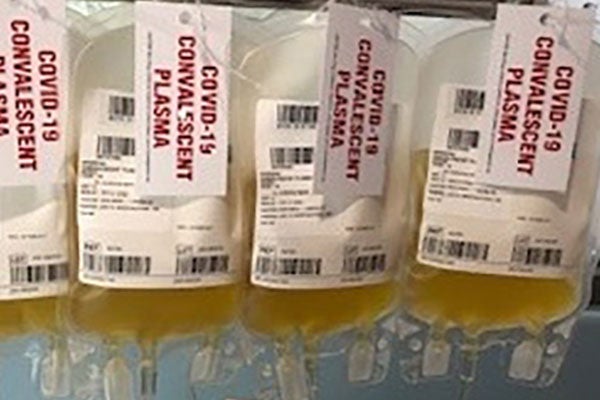
A Brody School of Medicine clinical investigation used antibodies from people who have recovered from COVID-19 to treat patients suffering from the novel coronavirus.
Dr. Rachel Roper, associate professor in the Brody School of Medicine’s Department of Microbiology and Immunology, has become a much sought-after source for expertise about the novel coronavirus and COVID-19 worldwide. Roper was on the team that sequenced the first SARS genome and lead the SARS coronavirus (CoV) vaccine testing in the early 2000s. She has been sourced extensively as an expert in local state, national and international media including The Scientist, New York Magazine and The Sydney Morning Herald.
Physicians from Brody and Vidant Health are pioneering new treatment methods for patients with COVID-19.
Dr. Paul Cook, chief of the Division of Infectious Disease, is heading a new clinical trial aimed at preventing COVID-19 from causing the type of lung damage in patients that is often fatal. The new treatment is intended to prevent and shorten the duration of Acute Respiratory Distress Syndrome (ARDS). The drug, which does not yet have a name but is referred to as LY3127804, is a monoclonal antibody to Angiopoietin-2.
Dr. Paul Bolin Jr., chair of internal medicine, is spearheading a clinical investigation into a procedure using antibodies from people who have recovered from COVID-19 to treat patients suffering from the novel coronavirus.
Bolin said that the academic nature of the ECU and Vidant partnership has enabled them to bring the processes and lessons learned in places such as New York, China and Italy to bear locally.
“We have extraordinary people working here, in the MICU and all the way through our units,” Bolin said. “Their ability to adapt and learn how to manage this new disease is inspiring.”
Innovation
Creativity and innovation have long been hallmarks of the Division of Health Sciences, but the past few months have demanded even more proactivity and forward thinking from our faculty, staff and students.
As the supply of personal protective equipment (PPE) was dwindling nationwide, a team of experts from the Brody School of Medicine, ECU’s College of Engineering and Technology and Vidant Health developed a process to decontaminate and reuse PPE. The methods, which were researched with the help of librarians from Laupus Library, will conserve and prolong the usefulness of PPE throughout all ECU Physicians clinic, the Brody School of Medicine and all Vidant Health locations in the event that the supply is disrupted.
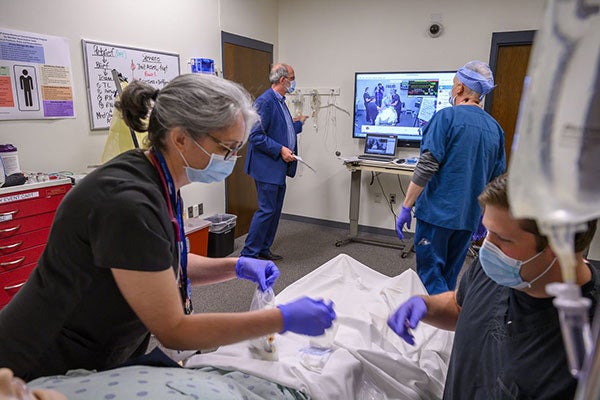
The clinical simulation lab at the Brody School of Medicine provides virtual classes for ECU medical and nursing students.
A pair of Brody faculty members worked with a local distillery, area farmers and other local businesses to produce hand sanitizer when local stores sold out. Using the FDA-approved recipe from the World Health Organization, they were was able to provide hand sanitizer to Greenville’s emergency homeless shelter, Community Crossroads Center, and other public agencies and nonprofits, before ultimately extending the offer to the community.
One medical student partnered with a Harvard medical student to create a COVID-19 coloring book to help kids understand the coronavirus, while another Brody student made a global difference by helping translate vital COVID-19 information into a variety of languages.
An ECU Physicians diabetes and weight management class went virtual, and organizers teamed up with the local farmers’ market in order to continue providing healthy food at no cost to participants. Greenville resident Diana Parker, who has lost about 25 pounds since joining the program in 2014, said she was thrilled that the program was able to continue despite the pandemic.
“It shows that they really care for their patients and I just thank God for them. I love them and I’ve loved the staff ever since I’ve been coming here,” Parker said.
Philanthropy
Thanks to the generosity of donors and friends, the Division of Health Sciences has been able to continue its efforts in education and health care.
In March, ECU began seeking support for emergency funds to assist students, faculty, staff and the community with coronavirus-related challenges. With more than 1,200 requests for funding since the beginning of the pandemic, the money raised continues to be distributed across campus to those in need.

College of Allied Health Sciences’ Dr. Xiaoming Zeng fundraising efforts through the Greenville Chinese School to raise $15,000 toward personal protective equipment for Greenville’s health care workers.
One of the largest donations was from the Delta Dental Foundation, the philanthropic arm of Delta Dental of North Carolina, Michigan, Indiana and Ohio. The foundation’s $10,000 gift to the School of Dental Medicine will help faculty, residents and staff continue providing emergency care for patients during the pandemic at ECU clinics and the school’s eight community service learning centers.
Another way donors can show support for ECU is by participating in Pirate Nation Gives—the university’s giving day—on June 24. Pirate Nation Gives is a 24-hour fundraising event that encourages all Pirates to come together and support the university. Through friendly social media competition and philanthropy, we can benefit our students and our future.
With the help of other ECU faculty and other members of the area’s Chinese community, Dr. Xiaoming Zeng, professor and chair of ECU College of Allied Health Sciences’ Department of Health Services and Information Management, led fundraising efforts through the Greenville Chinese School to raise $15,000 toward personal protective equipment for Greenville’s health care workers. The fundraiser’s 133 unique donations were enough to provide 10,000 surgical masks, 500 N95 masks, 300 protective suits and 1,550 face shields to Vidant Medical Center and ECU Physicians.
With support from the Medical & Health Sciences Foundation, Laupus Library was able to purchase additional e-books for distance-learning curriculum and clinical information resources related to infectious diseases. E-book access will help students, faculty and clinicians continue learning without having to borrow print materials onsite. The library also received funds for WiFi hotspots that can be loaned out to students who need to access the internet from home or other remote learning sites. The hotspots are available through the library’s equipment loan program which also includes laptops, cameras, charging cords and other items that can be picked up curbside by contacting robym18@ecu.edu.
Learn more about how you can support the mission of ECU’s Division of Health Sciences through the ECU Medical & Health Sciences Foundation, Inc..
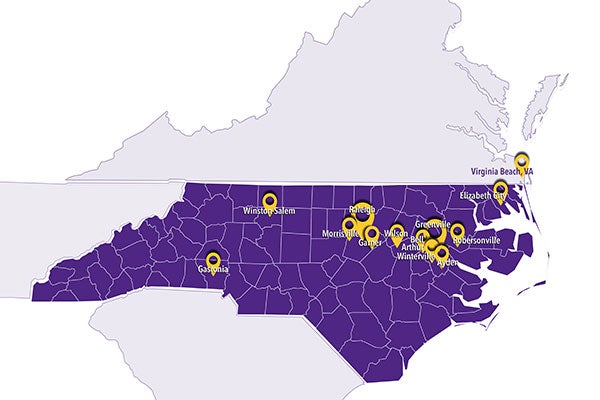
Throughout the COVID-19 pandemic, Laupus Library loaned laptops to ECU students located in North Carolina and Virginia with their expanded equipment loan program.
